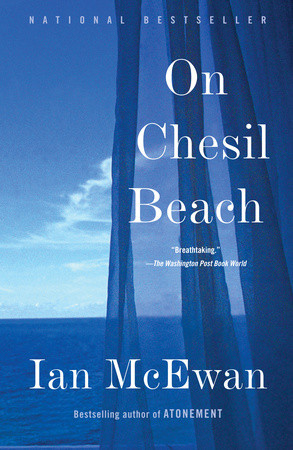As a novelist, the books I love best are the ones that bring on the urge for me to dash to the keyboard and get to work. My favorites suggest new tricks to be tried or a fresh angle on a theme, or simply fan the flames of my competitive side. They make me want to be a better writer.
And then there are the books so ingeniously, so poignantly, so perfectly written, that I want to put away my laptop and consider another line of work. I feel like Salieri at a Mozart concert. On Chesil Beach by Ian McEwan was one such book.
It’s short, barely 200 pages, but every word in this lovingly rendered portrait is as meticulously placed as paint on a porcelain miniature. The story follows Edward and Florence, a young English couple on their wedding night during the pre–Sexual Revolution 1960s. While a plot about the events leading up to the consummation of a marriage might sound limited in scope or even ludicrous, in McEwan’s masterful hands, it’s riveting.
Edward and Florence’s first night together becomes the turning point not just in their marriage but in their subsequent lives, and because McEwan makes this couple so real to us, we care—deeply. Any reader squeamish about delving into such a personal moment will find comfort in McEwan’s honesty, humor, and great affection for his characters. We come to know Edward and Florence as well as we know ourselves—maybe even better—and are eager to forgive them even when they can’t forgive themselves.
Filming has begun on a screen version of the book, starring Saoirse Ronan (whom you will remember from the film, Brooklyn—and also Atonement, based on the McEwan novel, for which she was nominated for an Academy Award as Best Supporting Actress).
While I will be the first in line to see the movie because I adore this story, McEwan’s writing is what stuns me. He chooses details with precision. Neglected housekeeping is conveyed by a bathroom sink in which you can “carve your name in the hard gray scum with your fingernail.” A corny marriage manual is a “modern, forward-looking handbook…with its cheery tones and exclamation marks and numbered illustrations…” The pill was “a rumor in the newspapers, a ridiculous promise, another of those tall tales about America.”
Yet, as much as I savor his words, I am most impressed by the ones McEwan leaves out. On Chesil Beach takes the Golden Rule of Writing—“show, don’t tell”—to the highest degree, sometimes not even telling. The reasons for Florence’s seemingly irrational behavior must be gleaned from between the lines, putting the responsibility of figuring them out squarely in the reader’s lap. The discovery of the myriad clues hiding in plain sight is one of the chief pleasures of the book.
Time, and about a dozen readings, have tempered me, and now the book that once daunted is one of the first that I reach for when my own writing has stalled. It’s amazing how a blocked work-in-progress can unkink itself once I remember what might be called McEwan’s Golden Rule: The story between the lines is often the one most worth telling.
Lynn Cullen is the author of Twain’s End and Mrs. Poe.








